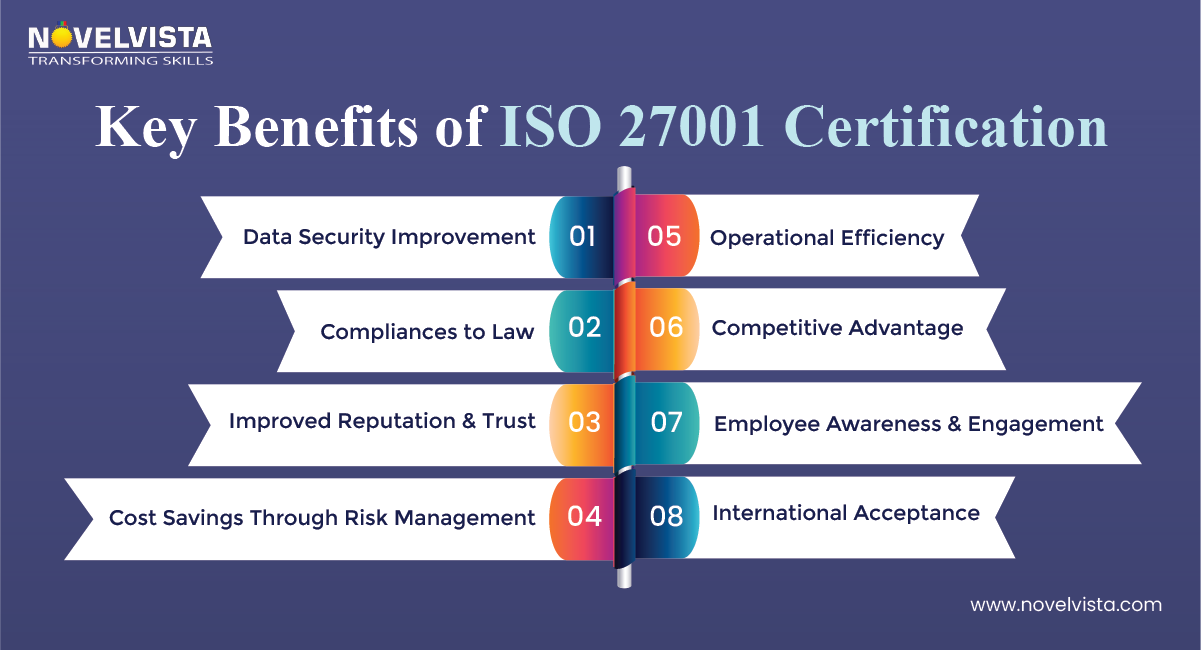What is ISO 27001, and why does it matter to your company's cybersecurity? This blog discusses many advantages of ISO 27001 and explains how data protection promotes a culture of continuous improvement and resilience against internet threats.
Today we will explore how this standard is pertinent but critical for your company and provides businesses with the necessary information to strengthen your digital defences. It is important to understand its core if any firm maintains information security. This practice guideline forms a comprehensive set of influences in the execution of the business on keeping their most private information highly secured.
The strong guidelines for managing a wide category of information security threats provide the ISO 27001 standard in the description and requirements for anInformation Security Management System (ISMS).
It does not restrict the digital world, as ISO 27001 involves any type of information processing and storage, from digital databases to physical files. A comprehensive strategy with a strong focus on protecting all data, irrespective of their form, ensures that all data is appropriately guarded against the continuously evolving risks in the information environment.
Achieving ISO 27001 certification is not a compliance exercise but it gives an organization tangible benefits contributing to overall success and resilience. Here are the key ISO 27001 benefits:

One of the main strengths of ISO 27001 is that it safeguards highly sensitive information against access through unauthorized means, cyber-attacks, and data breaches. A well-designed strategy for risk management ensures organizations can identify vulnerabilities and establish needed controls to monitor potential threats around the clock. It provides security not only to a customer's information but also to intellectual property and confidential information.
With data protection regulations like GDPR, HIPAA, and CCPA becoming stricter day by day, ISO 27001 provides a useful framework to achieve these requirements. Organizations that are successful in achieving certification can assert their commitment to regulatory compliance, thereby reducing the potential risk of penalties and judicial consequences. This is extremely relevant for industries like finance, healthcare, and e-commerce, where regulatory scrutiny is high.
A certified ISO 27001 management system signals to customers, partners, and stakeholders that your business prioritizes information security. In an era where consumers are increasingly cautious about sharing personal data, certification can significantly enhance brand credibility. This trust can translate into better client retention rates and an increased likelihood of securing new business opportunities.
Preventing data breaches and cybersecurity incidents can save businesses substantial costs associated with remediation, legal action, and reputation damage. ISO 27001's systematic risk assessment approach helps identify potential threats early and allocate resources effectively. Over time, this minimizes the likelihood of expensive security failures and ensures a better return on investment.
ISO 27001 encourages the culture of responsibility and continual improvement. Implementation of standard procedures and controls in organizations can facilitate them to better streamline operations with less duplication. Not only does it optimize the resources, but it also produces a resilient and responsive organization that would be responsive to changing security challenges.
In a marketplace in which clients frequently demand assurance of the strength of their data security, ISO 27001 certification can easily be a contract-winning proposition. Increasingly, more organizations now add ISO 27001 compliance as part of their selection criteria in choosing vendors. Therefore, this will put your business in the forefront as trusted and reliable partners, therefore giving it a competitive edge over its non-certified competitors.
ISO 27001 certificationachieved through training and awareness about the roles of employees involved in maintaining information security contributes to a security-conscious culture where employees are actively in charge of safeguarding organisational assets.
ISO 27001 is an international standard that can open doors to the global market. It will be very useful for businesses looking to expand their operations across borders, establishing trust and credibility with international clients and partners.
The need for ISO 27001 continues growing as more businesses become heavily dependent on digital technologies. In 2025, hybrid work environments, rapid cloud adoption, and Internet of Things (IoT) devices are bringing about issues that were not present hitherto. The highly adaptable framework of ISO 27001 ensures that there is an effective approach by businesses to address the upcoming risks.
To benefit from ISO 27001, a business has to adopt a structured process for certification:
The ISO 27001 certification advantages are far-reaching, from information security to a company's reputation, efficiency, and bottom line. Adopting this globally recognized standard in an age where data breaches and cyber threats are all around is not just good practice but business necessity.
By improving data protection, ensuring regulatory compliance, and building trust, ISO 27001 enables businesses to compete in the marketplace. For organizations looking to future-proof their operations, the journey toward ISO 27001 certification is a strategic investment with lasting returns.
Confused about our certifications?
Let Our Advisor Guide You